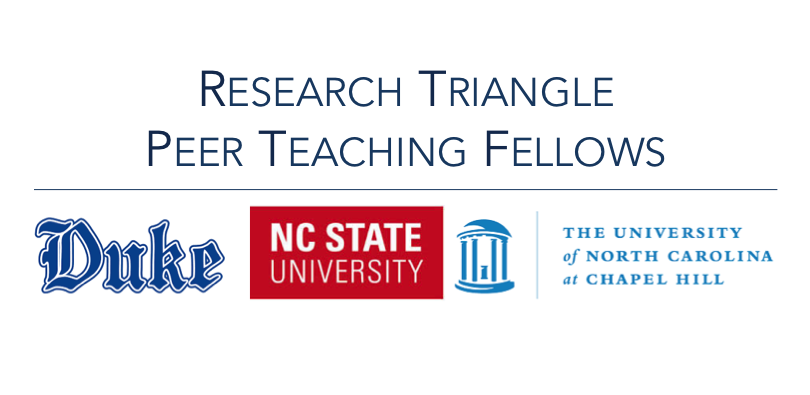
Research Triangle Peer Teaching Fellows
Scalable evidence-based peer teaching for improving CS capacity and diversity. (Funding: Google Research 3x3 Capacity Award)
Introduction
Duke University, University of North Carolina, and North Carolina State University will collaborate to develop a scalable effective teaching resource for introductory computer science courses: undergraduates employed as peer teaching fellows (PTFs). Undergraduates are used widely in support of Computer Science (CS) departments’ teaching missions as teaching assistants, section leaders, lab assistants, and tutors. Those undergraduates engaged in teaching have the opportunity to deeply engage with CS concepts and develop key communication and social competencies. As enrollments surge, PTFs play a more significant role in the experience and outcomes for students in courses. While faculty and graduate student instructional support does not necessarily increase with the number of students in our courses, the number of qualified undergraduate teaching assistants for introductory CS courses will more easily scale with the number of students in our courses. Anecdotally, undergraduates’ use of best practices for teaching and engaging students leaves much room for improvement, particularly for promoting retention among students from groups traditionally underrepresented in CS. We hypothesize that with proper recruitment and training based upon the novel research and development in this project, Peer Teaching Fellows will (1) serve as a scalable effective teaching resource that improves student learning in introductory computer science courses and (2) positively impact the climate in those courses to improve retention among women and underrepresented minorities.
Project Description
The overarching objective of the project is to increase CS retention and diversity by developing a highly scalable, effective, evidence-based peer teaching fellow training program. In order to best to support diverse CS students through peer teaching, we will identify the facets of peer teaching interactions that are particularly effective for supporting rigorous learning, computing identity, and ongoing engagement with the discipline. We will identify these effective facets of peer teaching by utilizing new methodologies, tools, and computational techniques for modeling collaborative dialogue at a fine-grained level within infrastructure created in prior work by the project team. The project will utilize these fine-grained models along with higher level factors to craft evidence-based pedagogical strategies that we hypothesize will significantly improve the student experience as measured by learning (both conceptual and problem-solving), identity (sense of belonging within the discipline), motivation (including interest and self-efficacy), and engagement (student retention within the course and the major). For the peer teaching fellows we aim to improve the same attitudinal measures (identity, motivation, and engagement) while also measuring the learning and practice of effective peer teaching methods. The project will shed light on the practices employed by peer teaching fellows and how fine-grained observational data can be used to provide insights about teaching and the climate for CS education.
publications
| 2018 | |
| [9] | Predicting Student Performance Based on Eye Gaze During Collaborative Problem Solving. Mehmet Celepkolu, Kristy Elizabeth Boyer. Proceedings of the 4th International Workshop on Group Interaction Frontiers in Technology (GIFT), 2018. [bib] |
| [8] | "Alright, What Do We Need?": A Study of Young Coders’ Collaborative Dialogue. Jennifer Tsan, Collin F. Lynch, Kristy Elizabeth Boyer. International Journal of Child-Computer Interaction, vol. 17, 2018, pp. 61-71. [bib] |
| [7] | "I Think We Should...": Analyzing Elementary Students' Collaborative Processes for Giving and Taking Suggestions. Jennifer Tsan, Fernando J. Rodríguez, Kristy Elizabeth Boyer, Collin Lynch. Proceedings of the 49th ACM Technical Symposium on Computer Science Education (SIGCSE), Baltimore, Maryland, 2018, pp. 622-627. [bib] |
| [6] | Thematic Analysis of Novice Students’ Reflections on Pair Programming. Mehmet Celepkolu, Kristy Elizabeth Boyer. Proceedings of the 49th ACM Technical Symposium on Computer Science Education (SIGCSE), Baltimore, Maryland, 2018, pp. 771-776. [bib] |
| [5] | The Importance of Producing Shared Code Through Pair Programming. Mehmet Celepkolu, Kristy Elizabeth Boyer. Proceedings of the 49th ACM Technical Symposium on Computer Science Education (SIGCSE), Baltimore, Maryland, 2018, pp. 765-770. [bib] |
| 2017 | |
| [4] | Think First: Fostering Substantive Contributions in Collaborative Problem-Solving Dialogues. Mehmet Celepkolu, Joseph B. Wiggins, Kristy Elizabeth Boyer, Kyla McMullen. Proceedings of the 12th International Conference on Computer Supported Collaborative Learning (CSCL), Philadelphia, Pennsylvania, 2017, pp. 295–302. [bib] |
| [3] | Toward Adaptive Collaborative Support for Elementary Students Learning Computer Science. Jennifer Tsan. Proceedings of the International Conference on Computer Supported Collaborative Learning - Doctoral Consortium, Philadelphia, Pennsylvania, 2017. [bib] |
| [2] | Deconstructing the Discussion Forum: Student Questions and Computer Science Learning. Mickey Vellukunnel, Philip Sheridan Buffum, Kristy Elizabeth Boyer, Jeffrey Forbes, Sarah Heckman, Ketan Mayer-Patel. Proceedings of the 48th ACM Technical Symposium on Computer Science Education (SIGCSE), Seattle, Washington, 2017, pp. 603-608. [bib] |
| 2016 | |
| [1] | Reference Resolution in Situated Dialogue with Learned Semantics. Xiaolong Li, Kristy Elizabeth Boyer. Proceedings of the 17th Annual SIGdial Meeting on Discourse and Dialogue (SIGDIAL 2016), 2016, pp. 329–338. [bib] |

